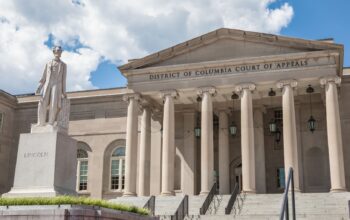by
Through sessions, panels and programming, the Congressional Black Caucus Foundation (CBCF) 53rd Annual Legislative Conference (ALC) is working to combat voter suppression and encourage all eligible voters to make their voices heard by casting ballots.
Thus far in 2024, the nonpartisan Brennan Center for Justice has tracked at least six states that have enacted seven restrictive voting laws. Overall, at least 291 restrictive bills have been considered in 40 states, making it harder for eligible Americans to cast their ballots.
Since 2022, the Brennan Center said they’ve also tracked election interference legislation, measures that allow for partisan interference in elections or threaten the people and processes that make elections work. These measures stand to not only harm existing election administration, but they also undermine voters’ faith in the security of elections, Brennan Center officials concluded.
Overall, at least 56 election interference bills have been considered in 21 states.
On the other hand, pro-voter legislators are seeking to expand access to the vote. Expansive laws have outpaced the number of restrictive laws passed. In 2024, at least 11 states have enacted 14 expansive laws. Overall, at least 631 expansive voting bills have been considered in 44 states.
But voter suppression remains real with one comprehensive analyst noting that states have added nearly 100 restrictive laws since the U.S. Supreme Court gutted the Voting Rights Act a decade ago.
Many new laws are found in states with a history of racial voting discrimination.
“Also in early July, an individual submitted two lists comprising around 34,000 voter challenges that alleged only that these people may have a new address,” Andrew Garber of the Brennan Center reported. “The county elections supervisor began the process of mailing those voters notices but was clear that he would not remove voters who don’t respond. Some of the county election boards tasked with implementing this undemocratic law are taking steps to mitigate the damage.”
Voter Education is Key, Learn Various Ways to Cast a Ballot
Voter education is a central focus at the Congressional Black Caucus Foundation’s 53rd Annual Legislative Conference, which runs from Sept. 11–15, in Washington, D.C. This year’s theme, “From Vision to Victory: Amplifying Black Voices,” underscores CBCF’s dedication to social justice and economic empowerment, particularly as new voting laws and restrictions threaten to disenfranchise communities of color.
With a growing number of Republican-led states enacting laws that complicate the voting process, the conference emphasizes the importance of understanding voting options, deadlines, and eligibility requirements. The information is crucial as voters navigate early voting, absentee voting, and mail-in ballots—methods that are becoming increasingly significant amid efforts to restrict access to the ballot box.
Absentee voting and vote-by-mail are critical ways voters can ensure their voices are heard. According to USA.gov, all states offer some form of absentee voting, though the rules and deadlines vary significantly. While some states require a valid excuse, such as illness, travel, or being a student out of state, others allow no-excuse absentee voting. Voters must be vigilant about meeting these deadlines, as missing them could result in their vote not being counted.
Vote-by-mail, another crucial option, is automatically available in states that conduct all-mail elections. According to the Movement Advancement Project, 19% of the voting-eligible population lives in states where every registered voter is mailed a ballot without needing to request one. These ballots can be returned through the mail, to secure drop boxes, or directly to election offices. For voters in the remaining 81% of states that do not conduct all-mail elections, understanding how to request and return a mail-in ballot is essential.
The Movement Advancement Project’s Democracy Maps, which track 44 election laws and policies, highlight the varying levels of accessibility across states. States are scored on a 32.5-point rubric, with favorable policies that expand voting access earning points and restrictive laws that limit civic engagement receiving negative scores. This tracking underscores the ongoing challenges voters face, especially in states where laws have been enacted to make voting more difficult.
For those who prefer to vote in person but want to avoid Election Day crowds, early in-person voting is available in 47 states, the District of Columbia, and several U.S. territories. However, Alabama, Mississippi, and New Hampshire do not offer this option, though absentee voting may be available for those eligible. Early voting periods vary widely, with some states offering up to 46 days of early voting. Additionally, many states provide weekend voting options, including 22 states that offer Saturday voting and nine that allow voting on Sundays.
Ensuring Voter Registration
New U.S. citizens are also encouraged to participate in the electoral process. After completing the naturalization process, new citizens can register to vote online, by mail, or in person at various government offices. While many believe voting is a right and a powerful way to contribute to the community, new citizens must ensure they are registered and aware of their voting rights and responsibilities.
Accessibility remains a critical issue in the voting process. The Americans with Disabilities Act (ADA) guarantees that polling places are equipped with accommodations to ensure all voters can participate fully. These accommodations include accessible voting machines, large print materials, and support for service animals. Voters are encouraged to contact their local election office ahead of time to confirm that the necessary accommodations will be available at their polling place.
It is still possible to register and vote for those without a fixed address, such as people experiencing homelessness. Voters can use addresses from shelters, religious centers, or general delivery at a local post office. Organizations and homeless service providers can offer additional resources to assist with voter registration and identification requirements.
Finally, voters with felony convictions should verify whether their voting rights have been restored, as this varies by state. The Department of Justice provides a comprehensive guide on state voting rules after a criminal conviction, offering crucial information for those looking to regain their right to vote.
Source: Published without changes from Washington Informer Newspaper




